How to Use ChatGPT in Recruitment: Why It Won’t Replace Recruiters
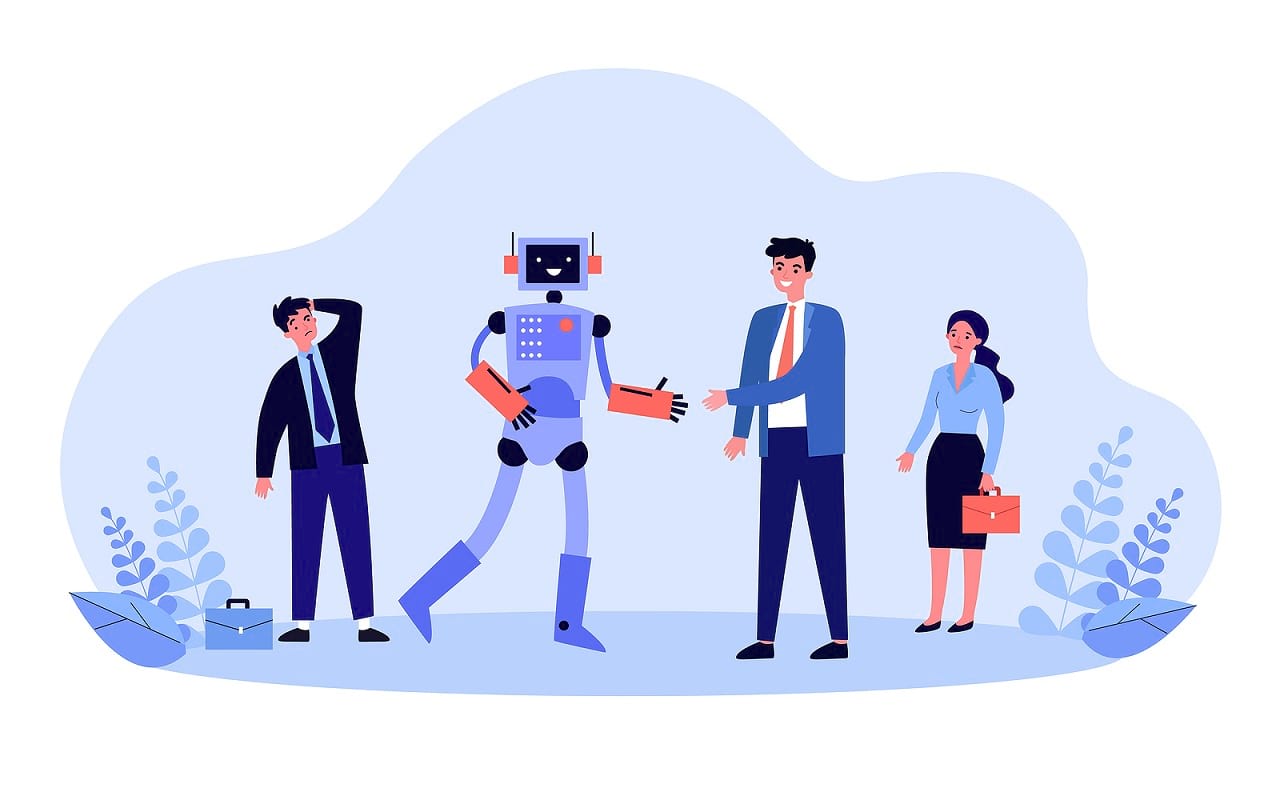
Using AI in recruitment is nothing new. Recruiter.com has used AI recruiting software that helps recruiters source candidates for challenging positions.
However, with the popularity of ChatGPT, recruiters are now wondering if they could use this tool for their recruiting process. Some are worried that it will take their jobs.
But as with past AI tools, it likely won’t replace many jobs. So instead of looking at it as a replacement, you can look at it as a tool to help you speed up your recruitment process.
Keep reading to learn all you need to know about ChatGPT and how you can leverage it in recruitment.
What Is ChatGPT?
Launched at the end of November 2022, ChatGPT has already reached over 1 million users . ChatGPT is part of OpenAI’s products, and it’s the start of new AI technology that can generate any text based on the prompts you enter. This ranges anywhere from text messages to emails or even e-books.
ChatGPT is a new softwarethat uses the GPT-3 language model. This language model is trained to scan the Internet and develop text human-like, conversationally. Many AI solutions have generated text before. ChatGPT is different because it’s fine-tuned to produce conversational texts, making it hard to tell the difference between AI and human-written texts.
That means it can analyze a question you enter into the prompt box, using AI and machine learning to generate a well-written response. You can even respond to the answer and personalize it by asking for different tones of voice or more explanations. This makes it great for marketers, virtual assistants, chatbots, customer service representatives, and recruiters.
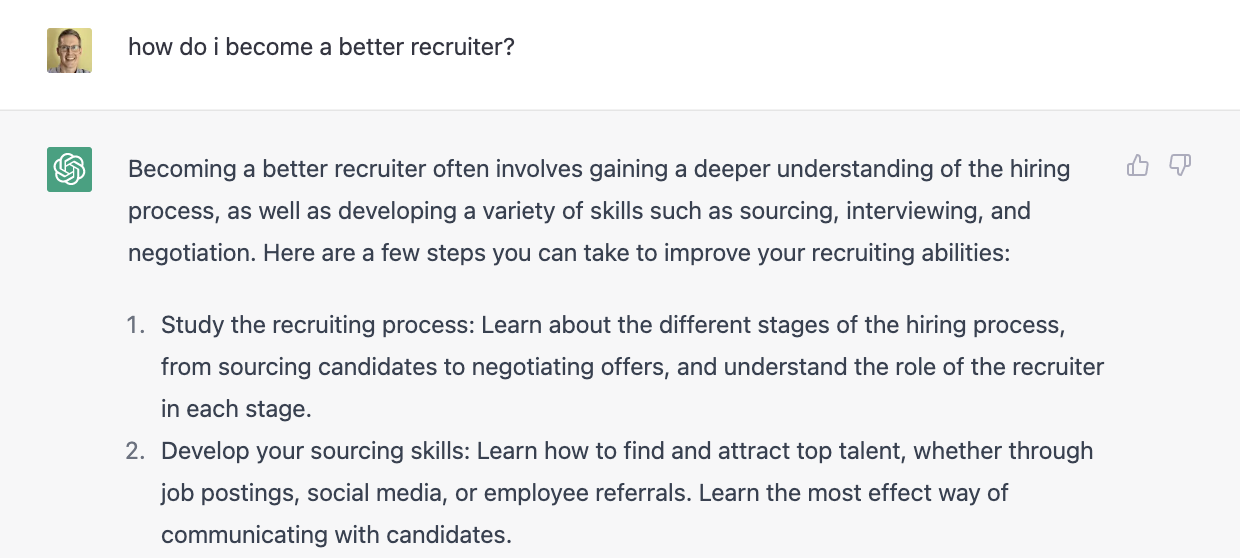
For now, ChatGPT is accessible to anyone to use. However, with more people using it and generating responses, AI will get more competent and produce even better text.
How Does ChatGPT Work?
Before understanding how ChatGPT works, you need to understand the basics of AI. In short, AI works by recognizing patterns. This could be patterns in code, examples, or texts.
ChatGPT uses AI to scan all text on the Internet and then interpret those patterns into a piece of text to answer your question or prompt. When you use it more, it will be better at recognizing patterns, which will help it improve in the long run.
To use it, you’ll need to create a free account. Once you’ve created an account, you’ll be prompted with a box to type in your prompt. For example, a recruiter could type, “Generate a list of interview questions for a flex developer.”
It may take a few minutes, but the AI will analyze other similar questions on the web and then look for answers. Once it recognizes common patterns, it will generate a piece of text like this:
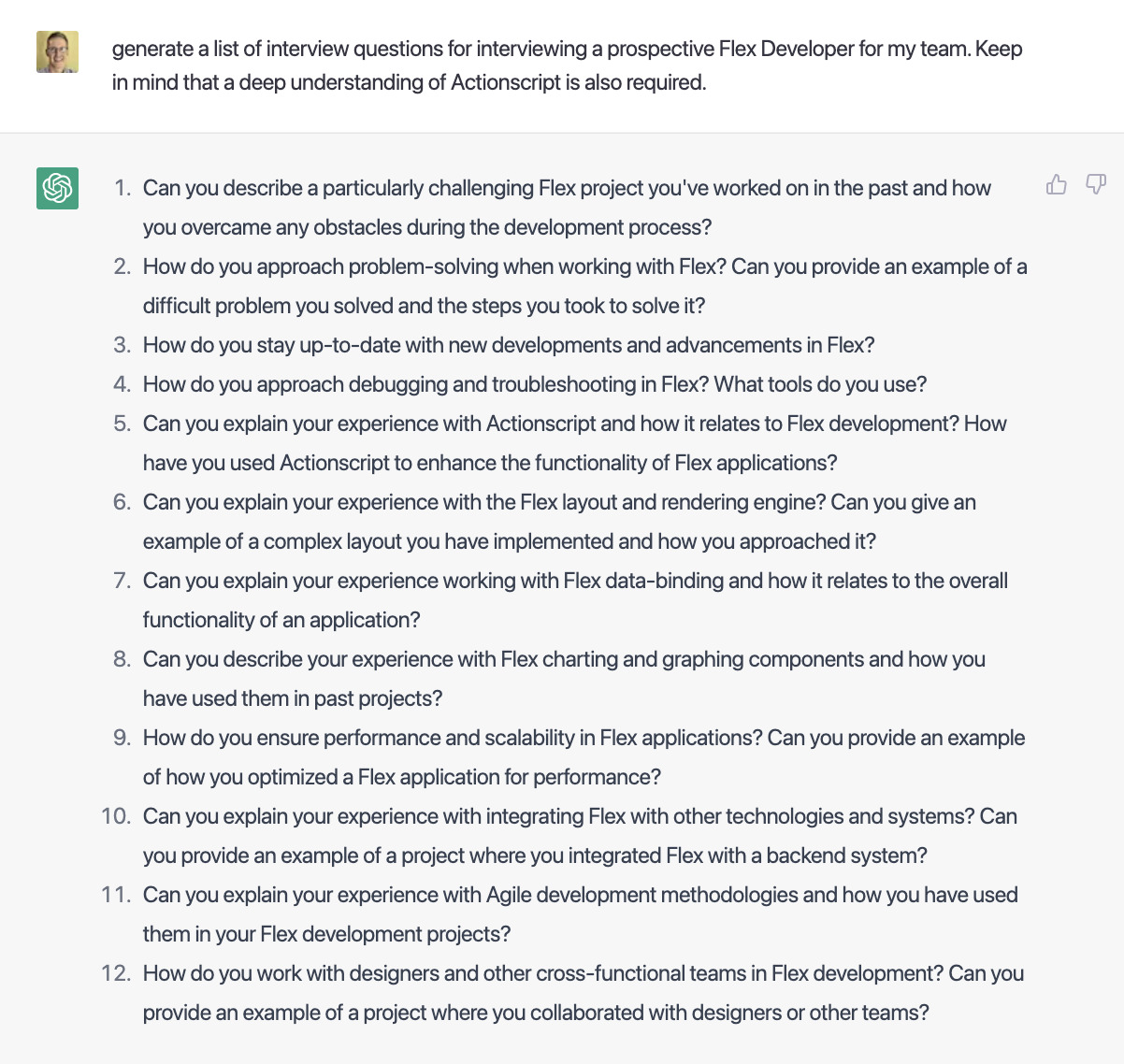
Examples of How You Can Use ChatGPT In the Recruitment Process
Recruiters must remember that ChatGPT is a chatbot and can’t assess a candidate’s fit for a role or make hiring decisions. It can only provide information and facilitate communication between the company and the candidates. Therefore, recruiters can use it best when using it as a tool.
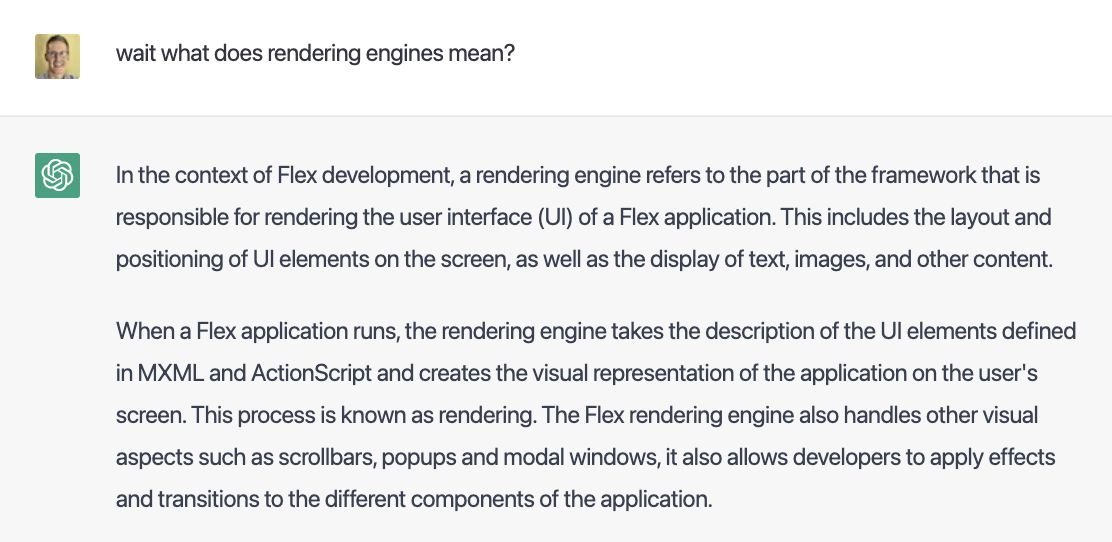
Scheduling Interviews
If you’re not using scheduling software, you can use ChatGPT to create different emails to help determine a candidate’s schedule.
You can also feed in your availability to make it easier for the candidate to pick which option works best for them. Then, once you get the reply, you can easily schedule it on your calendar and send it to the candidate. That way, you can save time going back and forth with different times that don’t work!
Writing Job Descriptions
Writing job descriptions can take a long time, especially if you’re creating them from scratch. You also must ensure that it doesn’t include biased or discriminatory language. However, ChatGPT can help you with that.
If you just put in the prompt to “write a job description for a Java Developer” you’ll get a generic result. However, if you designate specifics, you can have a closer final draft. For example, you can input information about your company culture and what specific responsibilities you’re looking for in that job opening.
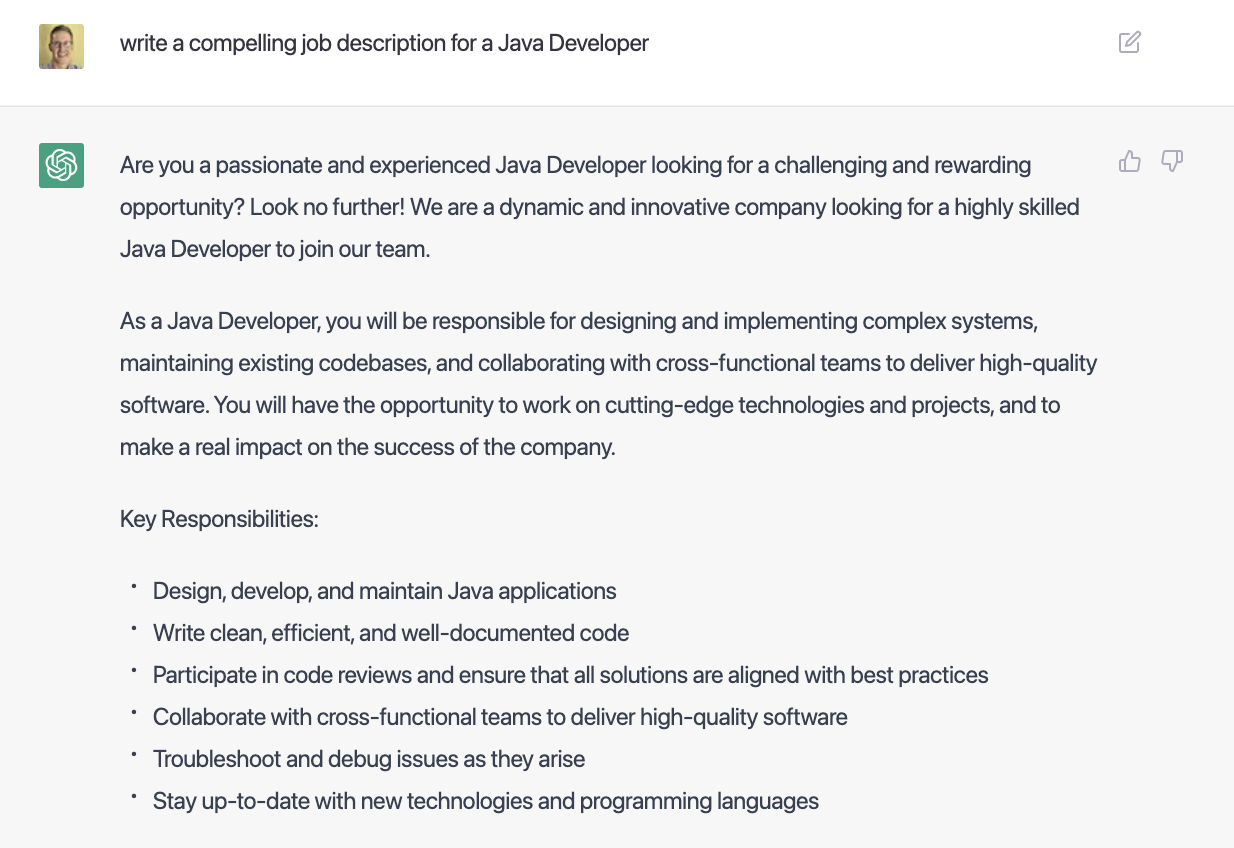
You can also feed ChatGPT more information about the role, company, and requirements that the candidate should have. If you want ChatGPT to write only part of the job description, you can also have them output a general outline that you can use as your guiding post.
Remember, you’ll need to edit, embellish, or rewrite parts of the AI-written job description. However, it can be a great starting point if you need help figuring out where to start. In addition, you can use this tool to streamline the job description process and locate candidates more quickly.
Improve Candidate Engagement
Some candidates will reach out throughout the interview process to get updates on where their application is and see if they need to do anything else to move forward. It can get overwhelming when dealing with hundreds of candidates for multiple job openings.
Thankfully, ChatGPT can help you write engaging email templates that you can send to candidates throughout every step of the process. Even if the candidate doesn’t reach out to you, you can send out these emails through every stage of the process to keep them updated on the process.
While you might not think these emails could be engaging, you can use ChatGPT to customize the emails’ voice, tone, and brand. These emails can seem like they were written by a human rather than receiving an automated HR administrator email that candidates are normally used to.
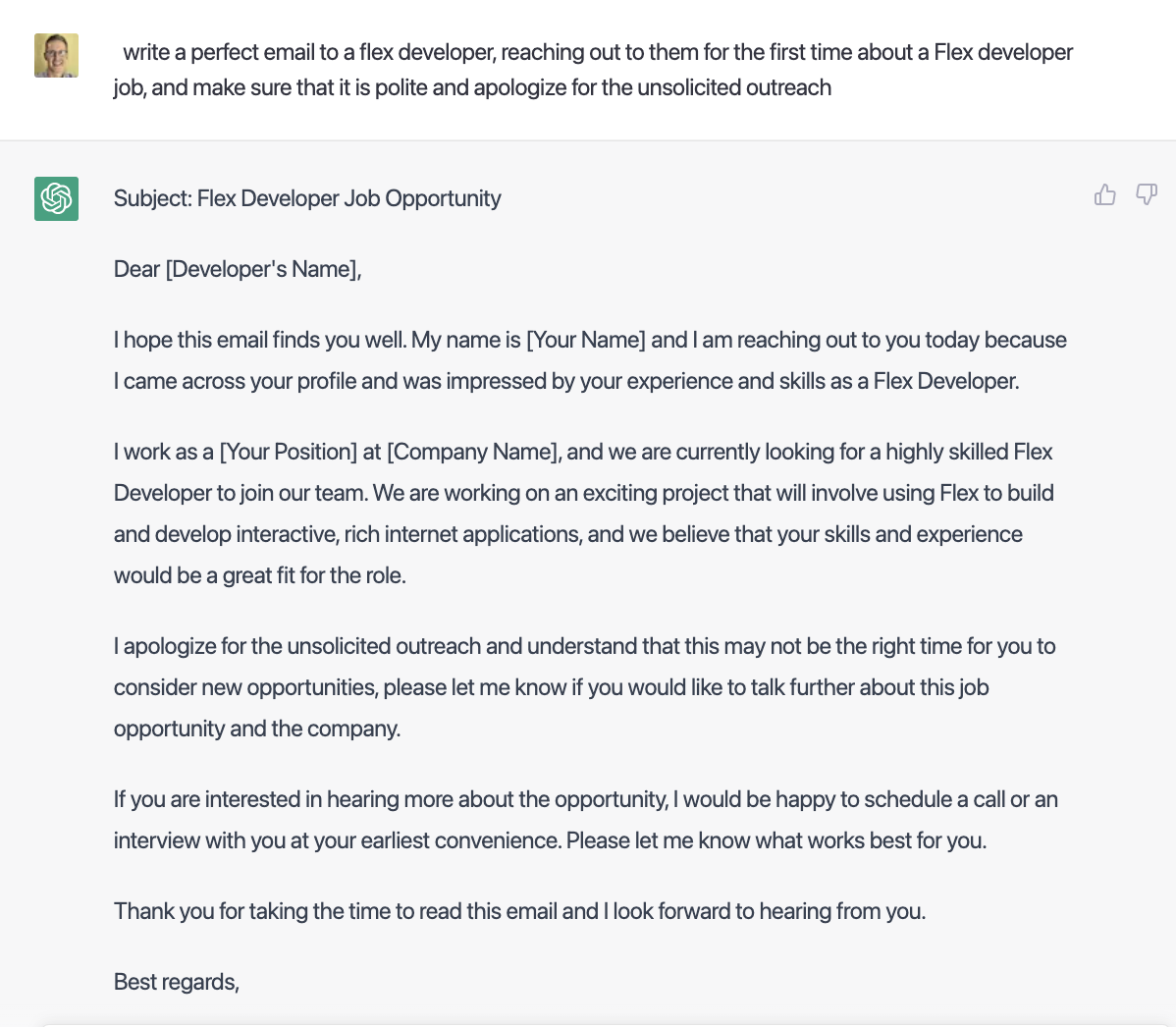
Develop Interview Questions
You’ll likely be interviewing for all roles if you’re a general recruiter. Creating interview questions for each role can be exhausting, but ChatGPT can generate a list of questions for each position. When you have these questions, you can choose which questions to ask for that role. Then, when you have those questions, you can create an interview question bank.
You can also modify the questions. For example, you can use it to ask questions about their personality, cultural fit, specific requirements, or background.
This can be a quick way to save time while standardizing your interview questions and ensuring that you ask the right questions to find the most suitable candidate.
Advantages and Disadvantages of Using ChatGPT in Recruitment
One of the advantages of using ChatGPT for your recruiting process is that it can be a valuable tool to help speed up the process. The recruiting process can take anywhere from a few days to four months , but you can speed up this timeline when you have tools to help you create engaging content.
This is also great for recruiters who don’t feel like writing is their strongest talent. While you’ll still need to read and edit the the ChatGPT text, it can be an excellent springboard to help you get started. It can even help you brainstorm ideas. For example, if you need help figuring out what interview questions to ask, ChatGPT can help you figure out that list.
One disadvantage of using it is that it’s still an AI tool. As a result, the outputs are only as good as the patterns it can recognize and the data that people feed it. This can lead to introduced biases in the language that some people may not even be aware of.
If you’re not careful with what data is going into it, you could, for example, write a job description with discriminatory language that discourages women or minorities from applying. This could make it harder to hire great talent, which is why you still need to review all of the text you’re using from ChatGPT.
Recruiters must also be careful of what information they are putting into ChatGPT. There are still privacy concerns if ChatGPT retains data from the previous inputs. You shouldn’t put candidates’ personal information into this as it could cause problems later.
What Does This Mean for the Future of Recruitment?
Many recruiters were worried that other AI recruiting technology would take their jobs, but in 2023, there are still many job openings for HR professionals.
While the text it produces is the most sophisticated regarding AI writing, it’s still imperfect. The text it makes is sometimes still robotic and less engaging, and you still have to spend time telling it what style and tone to write in. And even then, you’ll still need to look over it and make tweaks and adjustments.
Instead, recruiters and HR professionals will likely use ChatGPT in recruitment as a central tool. This can help them speed up the recruitment process to snag better talent quickly. If you’re using ChatGPT or other technology in your recruiting, your company will likely stay caught up, and you’ll need help to win top talent for your company.
While there will likely be improvements to ChatGPT as more people use it and it learns more, it is needed to replace the need for a human element in recruiting.
The Potential of ChatGPT in Recruitment
While we’ve discussed the existing applications of ChatGPT in recruitment, it’s equally important to consider its potential capabilities. As AI continues to evolve, the possibilities for its use in recruitment also expand.
- Advanced Pre-Screening: AI-powered chatbots like ChatGPT can gather preliminary information from candidates in pre-screening. This can include work experience, qualifications, or even responses to specific scenario-based questions. This enables recruiters to spend less time on initial screening and more time on engaging with shortlisted candidates.
- Candidate Experience Enhancement: ChatGPT can be instrumental in improving the candidate experience. Its ability to engage in human-like conversation allows for real-time interaction with candidates, providing immediate responses to their queries and keeping them informed about the application process. This contributes to a more engaging and positive recruitment experience, which is critical in a competitive job market.
- Data Analysis: Future iterations of ChatGPT could potentially integrate with data analytics tools to provide recruiters with valuable insights. This could include candidate behavior patterns, preferred communication channels, and sentiment analysis. Recruiters could fine-tune their strategies using these insights and enhance their recruitment efforts.
- Reducing Unconscious Bias: One of the most promising aspects of using AI in recruitment is its potential to reduce unconscious bias. With the right programming and guidelines, ChatGPT can be utilized to create job descriptions and interview questions that are neutral and fair, promoting a more diverse and inclusive recruitment process.
Disadvantages to Consider
While there is great potential in using AI in recruitment, it is important to be aware of certain challenges.
- Reliance on AI: As with any tool, over-reliance on AI can be problematic. It’s important to remember that AI should be used to enhance human efforts, not replace them. Recruiters should always ensure that the human element remains central to their work.
- Accuracy of Responses: While AI has made significant strides in generating human-like responses, it can still fall short in certain aspects. Misinterpretation or oversimplification of complex queries can lead to misinformation, which could potentially affect the recruitment process.
- Data Privacy: With stricter data privacy regulations coming into effect worldwide, it’s crucial to ensure that AI tools comply with these guidelines. Sensitive candidate data should always be handled carefully to prevent data breaches or information misuse.
ChatGPT Recruiting – Conclusion
In the fast-paced world of recruitment, AI tools like ChatGPT can serve as valuable assets. They offer the potential to streamline operations, enhance the candidate experience, and provide meaningful insights to recruiters. However, using these tools judiciously and in tandem with human judgment and expertise is important.
As the role of AI in recruitment continues to evolve, so will the responsibilities of recruiters. Rather than replacing them, AI will augment their abilities, allowing them to focus on what truly matters: connecting the right talent with the right opportunity.
Ultimately, the future of recruitment lies in the harmonious blend of artificial intelligence and human intuition, leveraging the strengths of each to create a more efficient and inclusive recruitment process. This is the exciting potential that tools like ChatGPT bring to the table.
Contact us today if you’re interested in how Recruiter.com leverages AI recruiting technology to help you find top talent!

